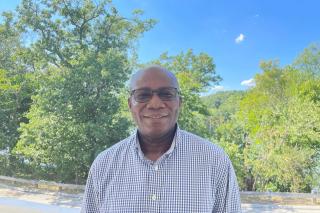Tell me about the work you do.
I am Vice President of Riverside Community Care. My job is to make sure that integrative healthcare is prioritized by our organization. We often come across cases of isolated care, in which patients might be seeing a specialist, but there is no communication among the different divisions of healthcare. For example, in a typical family, the child has a specialty place within the division of children and families, and the mother might be working with someone in behavioral health services, but there is no way for those two specialty services to connect in order to help the family as a whole.
I am focused on bringing integration into our system, which allows us to care for people’s minds and bodies. Without integration, you may not fully understand the factors that lead to a patient’s particular condition. For instance, a person with depression might only see a mental health specialist without exploring some of the underlying physiological causes of their depression. I believe that integration will create more positive outcomes for a variety of people.
How did you become interested in working in this area?
I grew up in Ghana and had never heard of the term mental health before I came to this country. When I came to the U.S., I managed to get a job at Arbour Hospital, where I learned a lot about mental health. I became fascinated with helping a person get the care that they need. At this past job, I was selected by the CEO for an employee award. On the same day, I got a call from Boston Medical inviting me to apply for a job, so I also worked there for a time. I eventually started working closely with psychiatrists and I learned so much from them. They encouraged me to go back to school, thinking I could serve my community even better if I had more educational experience. I met an intern who was a Simmons student, and he told me to apply to Simmons, which I did.
What was it like to be recognized by the Black and Latino Legislative Caucus at the 2022 Black Excellence on the Hill event?
I still can’t believe this. I have never thought of myself as special. I just feel that I have a responsibility to do the things that I do. When I do things that benefit the community, I feel that it is my own small way of paying back what society has given me.
My legislator nominated me for the award, and I had never talked to her in-person. I moderate a program called “Race Talk” or “Let’s Talk” which focuses on having difficult conversations and speaking about important issues. When I got an email from the Congresswoman’s office about the award nomination, I thought it was a scam. I even called the office to report the scam, but they told me it was real. That night I got an email from the Massachusetts Legislature informing me that I won the award. I’m still in shock.
How did Simmons prepare you to become a leader in your field?
Simmons helped me to grow exponentially. I came to Simmons with zero theoretical understanding of anything. I spent two very good years at Simmons in the master’s of social work program. I tell people that if you really want to get ahead and understand clinical work, Simmons is the place to go. Simmons gave me all the clinical knowledge I have and it was a wonderful experience.
Were there any particular Simmons faculty members who inspired you?
Several professors inspired me. Professor Beth Prullage’s class was so great that she made me realize that I truly wanted to pursue graduate school. Professor Lynn Sanford was an amazing teacher. Professor Dawn Belkin Martinez was my social action professor and was an excellent teacher. I also remember Professor Hugo Kamya to be quite inspiring.
Do you have any advice for current students wanting to pursue a similar path?
If you decide to study social work, you should consider yourself a person committed to doing good in society. The essence of social work is stepping aside and seeing humanity in real life. You want to position yourself to do good for the people around you. You cannot wait until someone says that you are special to do special things. Every single thing you do for your clients can be special to them.

